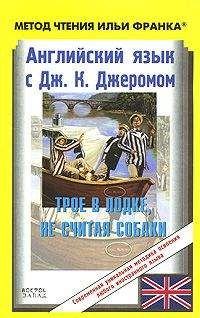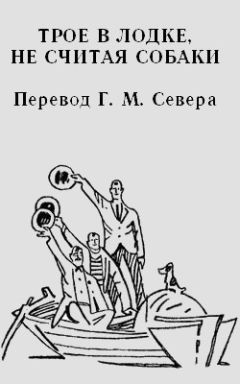Jerome Jerome - Английский язык с Джеромом К. Джеромом. Трое в лодке, не считая собаки
HARRIS (standing up in front of piano and addressing the expectant mob) (стоя перед фортепьяно и обращаясь к ожидающей толпе = публике): "I'm afraid it's a very old thing, you know (боюсь, это очень старая вещь, знаете ли). I expect you all know it, you know (полагаю, вы все ее знаете; to expect — ожидать; надеяться; полагать). But it's the only thing I know (но это единственное, что я знаю). It's the judge's song out of Pinafore (это песня судьи из Передника) — no, I don't mean Pinafore — I mean — you know what I mean (нет, я имею в виду не Передник, я говорю о… вы знаете, о чем) — the other thing, you know (другую вещь). You must all join in the chorus, you know (вы все должны подпевать хором; to join in — присоединяться, принимать участие, подхватывать)."
chorus [ˈkɔ:rǝs] verse [vǝ:s] different [ˈdɪf(ǝ)rǝnt]
You don't expect a man to never remember more than the first three lines of the first verse, and to keep on repeating these until it is time to begin the chorus. You don't expect a man to break off in the middle of a line, and snigger, and say, it's very funny, but he's blest if he can think of the rest of it, and then try and make it up for himself, and, afterwards, suddenly recollect it, when he has got to an entirely different part of the song, and break off, without a word of warning, to go back and let you have it then and there. You don't — well, I will just give you an idea of Harris's comic singing, and then you can judge of it for yourself.
HARRIS (standing up in front of piano and addressing the expectant mob): "I'm afraid it's a very old thing, you know. I expect you all know it, you know. But it's the only thing I know. It's the judge's song out of Pinafore — no, I don't mean Pinafore — I mean — you know what I mean — the other thing, you know. You must all join in the chorus, you know."
(Murmurs of delight and anxiety to join in the chorus (шепот наслаждения и беспокойства /в предвкушении/ пения хором). Brilliant performance of prelude to the Judge's song in "Trial by Jury" by nervous pianist (блестящее исполнение прелюдии/вступления к песне судьи в «Суде Присяжных» взволнованным пианистом). Moment arrives for Harris to join in (наступает момент, чтобы вступил Гаррис). Harris takes no notice of it (Гаррис не замечает этого). Nervous pianist commences prelude over again (взволнованный пианист начинает прелюдию снова), and Harris, commencing singing at the same time (и Гаррис, начиная петь в то же самое время), dashes off the first two lines of the First Lord's song out of "Pinafore (выпаливает начальные две строчки песни Первого Лорда из «Передника»; to dash off — броситься; быстро набросать /письмо, заметку и т.д./)." Nervous pianist tries to push on with prelude, gives it up (взволнованный пианист пытается ускорить прелюдию, сдается), and tries to follow Harris with accompaniment to Judge's song out of "Trial by Jury (пробует следовать = угнаться за Гаррисом, аккомпанируя песне Судьи из «Суда Присяжных»)," finds that doesn't answer, and tries to recollect what he is doing, and where he is (обнаруживает, что это не подходит, и пытается вспомнить, что он делает и где находится; to answer — отвечать, реагировать; соответствовать), feels his mind giving way, and stops short (чувствует, что его память изменяет ему, и внезапно останавливается; to give away — раздавать; упускать; сдаваться, портиться).)
HARRIS (with kindly encouragement) (с доброжелательным ободрением): "It's all right (все в порядке). You're doing it very well, indeed — go on (вы делаете это очень хорошо, в самом деле, —продолжайте)."
NERVOUS PIANIST (взволнованный пианист): "I'm afraid there's a mistake somewhere (боюсь, где-то /произошла/ ошибка). What are you singing (что вы поете)?"
prelude [ˈprelju:d] accompaniment [ǝˈkʌmpǝnɪmǝnt] answer [ˈɑ:nsǝ]
(Murmurs of delight and anxiety to join in the chorus. Brilliant performance of prelude to the Judge's song in "Trial by Jury" by nervous pianist. Moment arrives for Harris to join in. Harris takes no notice of it. Nervous pianist commences prelude over again, and Harris, commencing singing at the same time, dashes off the first two lines of the First Lord's song out of "Pinafore." Nervous pianist tries to push on with prelude, gives it up, and tries to follow Harris with accompaniment to Judge's song out of "Trial by Jury," finds that doesn't answer, and tries to recollect what he is doing, and where he is, feels his mind giving way, and stops short.)
HARRIS (with kindly encouragement): "It's all right. You're doing it very well, indeed — go on."
NERVOUS PIANIST: "I'm afraid there's a mistake somewhere. What are you singing?"
HARRIS (promptly) (быстро/не задумываясь): "Why the Judge's song out of Trial by Jury (как, песню Судьи из Суда Присяжных). Don't you know it (разве вы не знаете ее)?"
SOME FRIEND OF HARRIS'S (один приятель Гарриса) (from the back of the room) (из глубины комнаты; back — спина; задняя часть): "No, you're not, you chuckle-head, you're singing the Admiral's song from Pinafore (нет, болван, ты поешь песню Адмирала из Передника)."
(Long argument between Harris and Harris's friend as to what Harris is really singing (продолжительный спор между Гаррисом и его приятелем по поводу того, что Гаррис поет в действительности). Friend finally suggests that it doesn't matter what Harris is singing (наконец приятель высказывает мысль, что не важно, что поет Гаррис) so long as Harris gets on and sings it (лишь бы Гаррис продолжал и пел; so long as — поскольку; при условии, что), and Harris, with an evident sense of injustice rankling inside him (а Гаррис, с явным чувством несправедливости, терзающим его; inside — внутри), requests pianist to begin again (просит пианиста начать снова). Pianist, thereupon, starts prelude to the Admiral's song (пианист вслед за этим начинает прелюдию к песне Адмирала), and Harris, seizing what he considers to be a favourable opening in the music, begins (а Гаррис, воспользовавшись, по его мнению: «что он считает», подходящим моментом в музыке, начинает; to seize — схватить/ся/; воспользоваться; favourable — благоприятный; подходящий; opening — открытие, вступительная часть, начало; удобный случай, благоприятная возможность).)
evident [ˈevɪd(ǝ)nt] request [rɪˈkwest] seizing [ˈsi:zɪŋ]
HARRIS (promptly): "Why the Judge's song out of Trial by Jury. Don't you know it?"
SOME FRIEND OF HARRIS'S (from the back of the room): "No, you're not, you chuckle-head, you're singing the Admiral's song from Pinafore."
(Long argument between Harris and Harris's friend as to what Harris is really singing. Friend finally suggests that it doesn't matter what Harris is singing so long as Harris gets on and sings it, and Harris, with an evident sense of injustice rankling inside him, requests pianist to begin again. Pianist, thereupon, starts prelude to the Admiral's song, and Harris, seizing what he considers to be a favourable opening in the music, begins.)
HARRIS:
"When I was young and called to the Bar (когда я был молодым и стал адвокатом; to be called to the Bar — получать право адвокатской практики в суде; bar — брусок; препятствие; барьер, отделяющий судей от подсудимых; the Bar — адвокатура, адвокатская практика).' "
[General roar of laughter, taken by Harris as a compliment (общий взрыв смеха, принимаемый Гаррисом за комплимент). Pianist, thinking of his wife and family, gives up the unequal contest and retires (пианист, думая о своей жене и детях: «семье», отказывается от неравной борьбы и удаляется; contest — спор, состязание, соперничество); his place being taken by a stronger-nerved man (его место занимает человек с более крепкими нервами).
THE NEW PIANIST (Cheerily) (новый пианист /весело, ободряюще/): "Now then, old man, you start off, and I'll follow (итак, старина, вы начинайте, а я последую /за вами/). We won't bother about any prelude (мы не будем беспокоиться о прелюдии = начнем без вступления)."
HARRIS (Upon whom the explanation of matters has slowly dawned — laughing) (до которого объяснение дела медленно дошло = понял, в чем дело, смеясь): "By Jove (ей-богу; Jove — Юпитер; by Jove! — клянусь Юпитером! ей-богу!)! I beg your pardon (прошу прощения). Of course — I've been mixing up the two songs (конечно, я перепутал две песни). It was Jenkins confused me, you know (это Дженкинс сбил меня с толку). Now then (итак).
contest [ˈkɔntest] confused [kǝnˈfju:zd]
HARRIS:
"When I was young and called to the Bar."
(General roar of laughter, taken by Harris as a compliment. Pianist, thinking of his wife and family, gives up the unequal contest and retires; his place being taken by a stronger-nerved man.
THE NEW PIANIST (Cheerily): "Now then, old man, you start off, and I'll follow. We won't bother about any prelude."
HARRIS (Upon whom the explanation of matters has slowly dawned — laughing): "By Jove! I beg your pardon. Of course — I've been mixing up the two songs. It was Jenkins confused me, you know. Now then.
[Singing (поет); his voice appearing to come from the cellar (его голос, кажется = как будто исходит из погреба), and suggesting the first low warnings of an approaching earthquake (и напоминает первые тихие признаки приближающегося землетрясения; warning — предупреждение; знак, признак).]
"When I was young I served a term (когда я был молодым, я служил одно время)
As office-boy to an attorney's firm (рассыльным в фирме адвоката)."
(Aside to pianist) (в сторону, пианисту): "It is too low, old man (слишком низко, старина); we'll have that over again, if you don't mind (начнем заново, если не возражаете)."
(Sings first two lines over again, in a high falsetto this time (поет первые две строчки снова, высоким фальцетом на этот раз). Great surprise on the part of the audience (большое удивление со стороны публики). Nervous old lady near the fire begins to cry, and has to be led out (нервная старая дама у камина начинает плакать, и ее приходится вывести; to lead out).)
HARRIS (continuing) (продолжая):
"I swept the windows and I swept the door (я мыл окна и подметал пол; to sweep — мести, подметать; смывать; door — дверь, дверной проем; дом, помещение),
And I — "
earthquake [ˈǝ:Ɵkweɪk] attorney [ǝˈtǝ:nɪ]
(Singing; his voice appearing to come from the cellar, and suggesting the first low warnings of an approaching earthquake.)
"When I was young I served a term
As office-boy to an attorney's firm."
(Aside to pianist): "It is too low, old man; we'll have that over again, if you don't mind."



